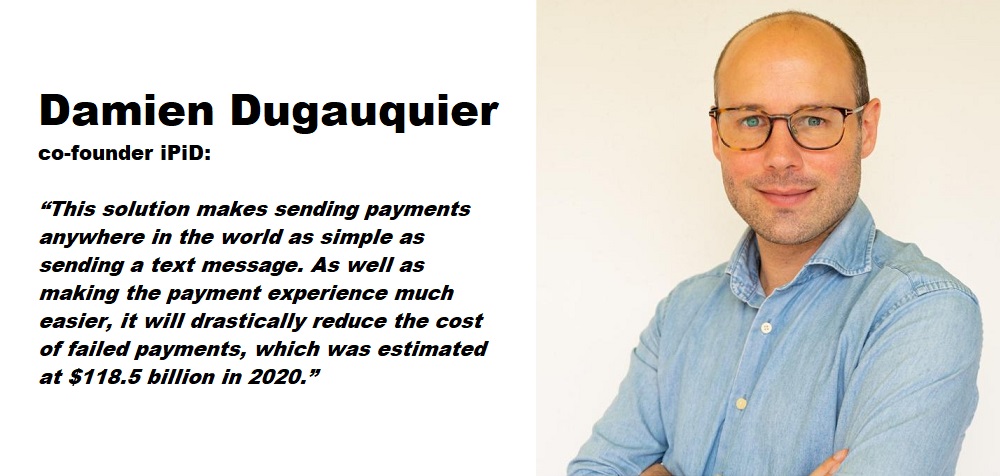
First-of-its-kind service enables users to make cross-border payments, anywhere in the world, using only a simple proxy for the payee’s identity.
iPiD and PALO IT have joined forces to develop an addressing service that means payment service providers can easily process international payments based on a single piece of the recipient’s data, such as a phone number.
Damien Dugauquier, iPiD co-founder, says: “This solution makes sending payments anywhere in the world as simple as sending a text message. As well as making the payment experience much easier, it will drastically reduce the cost of failed payments, which was estimated at $118.5 billion in 2020”[1].
The iPiD addressing service replicates globally the experience that customers have become used to for their domestic payments in many countries, including Zelle in the Unites States, PayNow in Singapore, NPP in Australia and Bizum in Spain.
„The iPiD addressing service is unique because it requires only one piece of information that most people know, such as a phone number or email address, to execute a cross-border payment,” according to the press release.
iPiD uses this information to retrieve the other data that is required, including an account number and bank name, without the payee needing to provide financial details they may not be familiar with.
„In this way, iPiD removes friction from the payment experience by bridging the ‘data gap’ between multiple reference databases and payment systems,” the company explains.
Because it is platform-agnostic and based on API technology, iPiD works on existing payment rails, can be integrated into any bank and fintech solution, and leverages existing regulatory compliance processes.
iPiD orchestrates APIs without storing confidential or personal data, hence maintaining data sovereignty and reusing local open banking APIs. iPiD and PALO IT leverage Microsoft for the service’s central technology infrastructure.
Christian Sarafidis, Microsoft chief business development officer Worldwide Financial Services, says: “iPiD works on a very real problem for the payments industry. I am delighted that they have selected Microsoft Azure as their platform of choice to deploy iPID’s core services. It is testament to Microsoft Azure being the right platform for promising fintechs that require a high level of compliance and security, and a global infrastructure footprint.”
iPiD partnered with PALO IT to build this ground-breaking solution and, in December 2021, concluded a successful proof of concept when the first data was exchanged over the iPiD global decentralized addressing system. iPiD will be the operator of the technology moving forward and will be onboarding fintech and financial institutions to the platform in 2022.
“The financial sector has seen a swell of tech-led shifts over the last few years. Providing an innovative digital experience should sit at the top of any banking institution’s priority list, and it sits at the top of ours as well,” says PALO IT co-founder Tanguy Fournier Le Ray.
_____________
[1] 07/14/2021, True Cost of Failed Payments report. https://risk.lexisnexis.com/about-us/press-room/press-release/20210714-true-cost-of-failed-payments
Banking 4.0 – „how was the experience for you”
„So many people are coming here to Bucharest, people that I see and interact on linkedin and now I get the change to meet them in person. It was like being to the Football World Cup but this was the World Cup on linkedin in payments and open banking.”
Many more interesting quotes in the video below: